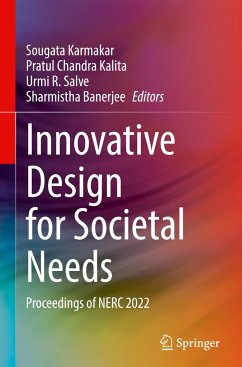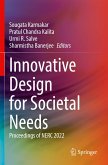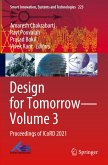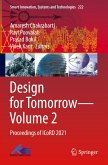Innovative Design for Societal Needs
Proceedings of NERC 2022
Herausgegeben:Karmakar, Sougata; Chandra Kalita, Pratul; Salve, Urmi R.; Banerjee, Sharmistha
Innovative Design for Societal Needs
Proceedings of NERC 2022
Herausgegeben:Karmakar, Sougata; Chandra Kalita, Pratul; Salve, Urmi R.; Banerjee, Sharmistha
- Gebundenes Buch
- Merkliste
- Auf die Merkliste
- Bewerten Bewerten
- Teilen
- Produkt teilen
- Produkterinnerung
- Produkterinnerung
This book presents select proceedings of North-East Research Conclave (NERC 2022) on innovative design for societal needs. Human Society and culture are a continuously evolving, complex, and intelligent system. The social needs of humans today are exacerbated by extremely unbalanced regional economic development and cultural identity crises across the globe and within states. This edited book presents cutting-edge research on how design innovation can be used to bring sustainable and meaningful social change. It also provides novel directions for future researchers interested in exploring the…mehr
Andere Kunden interessierten sich auch für
![Innovative Design for Societal Needs Innovative Design for Societal Needs]() Innovative Design for Societal Needs131,99 €
Innovative Design for Societal Needs131,99 €![Design in the Era of Industry 4.0, Volume 2 Design in the Era of Industry 4.0, Volume 2]() Design in the Era of Industry 4.0, Volume 2282,99 €
Design in the Era of Industry 4.0, Volume 2282,99 €![Design in the Era of Industry 4.0, Volume 1 Design in the Era of Industry 4.0, Volume 1]() Design in the Era of Industry 4.0, Volume 1282,99 €
Design in the Era of Industry 4.0, Volume 1282,99 €![Design in the Era of Industry 4.0, Volume 2 Design in the Era of Industry 4.0, Volume 2]() Design in the Era of Industry 4.0, Volume 2282,99 €
Design in the Era of Industry 4.0, Volume 2282,99 €![Design in the Era of Industry 4.0, Volume 3 Design in the Era of Industry 4.0, Volume 3]() Design in the Era of Industry 4.0, Volume 3418,99 €
Design in the Era of Industry 4.0, Volume 3418,99 €![Design for Tomorrow-Volume 3 Design for Tomorrow-Volume 3]() Design for Tomorrow-Volume 3254,99 €
Design for Tomorrow-Volume 3254,99 €![Design for Tomorrow-Volume 2 Design for Tomorrow-Volume 2]() Design for Tomorrow-Volume 2154,99 €
Design for Tomorrow-Volume 2154,99 €-
-
-
This book presents select proceedings of North-East Research Conclave (NERC 2022) on innovative design for societal needs. Human Society and culture are a continuously evolving, complex, and intelligent system. The social needs of humans today are exacerbated by extremely unbalanced regional economic development and cultural identity crises across the globe and within states. This edited book presents cutting-edge research on how design innovation can be used to bring sustainable and meaningful social change. It also provides novel directions for future researchers interested in exploring the impact of design innovation and design thinking on human society. The book can be a valuable reference for beginners, researchers, and professionals interested in innovative design and allied fields.
Produktdetails
- Produktdetails
- Verlag: Springer / Springer Nature Singapore / Springer, Berlin
- Artikelnr. des Verlages: 978-981-99-6467-3
- 1st edition 2024
- Seitenzahl: 208
- Erscheinungstermin: 16. Dezember 2023
- Englisch
- Abmessung: 241mm x 160mm x 17mm
- Gewicht: 521g
- ISBN-13: 9789819964673
- ISBN-10: 9819964679
- Artikelnr.: 68599160
- Herstellerkennzeichnung Die Herstellerinformationen sind derzeit nicht verfügbar.
- Verlag: Springer / Springer Nature Singapore / Springer, Berlin
- Artikelnr. des Verlages: 978-981-99-6467-3
- 1st edition 2024
- Seitenzahl: 208
- Erscheinungstermin: 16. Dezember 2023
- Englisch
- Abmessung: 241mm x 160mm x 17mm
- Gewicht: 521g
- ISBN-13: 9789819964673
- ISBN-10: 9819964679
- Artikelnr.: 68599160
- Herstellerkennzeichnung Die Herstellerinformationen sind derzeit nicht verfügbar.
Dr. Sougata Karmakar is Associate Professor and Head of the Department of Design at the Indian Institute of Technology (IIT) Guwahati, India. He gained research expertise in the field of Ergonomics and Human Factors from DIPAS, Defence Research and Development Organization (DRDO), Delhi between November 2004 and November 2009, and received his Ph.D. on "Virtual ergonomics using digital human modelling." He received P.G. Diploma in Management with a specialization in Human Resource Management from Pondicherry University. He is associated with a well-equipped ergonomics laboratory at the Department of Design, IIT Guwahati, and continuing his research work in ergonomics and human factors. His research interests span physical ergonomics (product and workstation design), cognitive ergonomics (information processing), design and work environment, design, and occupational health, virtual simulation (CAD and digital human modelling), etc. Dr. Karmakar has guided eight Ph.D. studentsand eight students are presently pursuing their doctoral research under his guidance. Dr. Karmakar has conducted several national and international workshops and webinars related to ergonomics and human factors, occupational health and safety, and industrial design. He has published 44 research papers in international journals and 47 research papers in various referred international conference proceedings. He is contributing as a reviewer for various international journals of repute. He has filed and published 3 utility patents and 12 design patents. Out of these, 11 patents, including 2 utilities and 9 designs, have been granted. Dr. Pratul Ch. Kalita is Associate Professor in the Department of Design at the Indian Institute of Technology (IIT) Guwahati, India. He has widespread industrial and academic experience in the field of design, technology, and management. He obtained Ph.D. in Design from Indian Institute of Technology Guwahati in Design Management.He did B.E. in Production Engineering and Management from National Institute of Technology, Jamshedpur, followed by Master of Marketing Management from Pondicherry University (Central University). He served for JMT Auto, Jamshedpur in CNC manufacturing and control and BOC India (now Linde Group) in design and erection of air separation and hydrogen plants. He is one of the founder members of Acumen Consultancy Services, Kolkata. Prior to IITG, he was an assistant professor in Assam Institute of Management, Guwahati, teaching management research methodology, product design and development, and operations management. He has been instrumental in establishing industry-institute partnerships in North-East India. He has provided consultancy services to the Government of India, Government of Assam, and many private organizations of repute. At present he is engaged in number of research and consultancy projects. Recently, he completed the 'Diagnostic Study on Weaver's Need in Respect of Eri and Muga Silk' under the World Bank financed Assam Agribusiness and Rural Transformation Project (APART). The World Bank is keen to implement the design management strategies formulated in the study. He has provided design management consultancy to the Ministry of Textiles at Sivasagar Mega Handloom Cluster Development project. He has also completed the prestigious IMPRINT project sponsored by MOE and ICMR on System Design for Tuberculosis Programme Administration. His recent projects include impact assessment studies for roads, bridges, and irrigation projects funded by NABARD, Prime Minister Entrepreneurship Generation Programme, Prime Minister Rozgar Yojana, Swarna Jayanti Shahari Rozgar Yojana, etc. Dr. Urmi Ravindra Salve is Assistant Professor in the Department of Design at the Indian Institute of Technology (IIT) Guwahati, India. She obtained Ph.D. in Science (Ergonomics) from Calcutta University and has expertise in human factor engineering, research methodology, cognitive ergonomics, occupational health related problem, human physiology, etc. She has more than ten years of research experience in ergonomics and human factors engineering in different research bodies, including TIFAC-CORE NITIE, Mumbai, India. She further worked in the field of occupational hygiene at National Institute of Miners' Health, Department of Mines, Govt. of India. She has more than 60 full study and abstract publications in national and international journals and conference proceedings. She has attended and organized numerous conferences and workshops, written study materials on the concerned subjects, and delivered lectures at various institutions. Dr. Sharmistha Banerjee is Assistant Professor in the Department of Design at the Indian Institute of Technology (IIT) Guwahati, India. She obtained Ph.D. in Design for sustainability in the arena of scale-appropriate agricultural equipment design from IIT Guwahati. She has completed Bachelor's in Industrial Design from IIT Guwahati and Master's in Integrated Product Design from Technical University of Delft, Netherlands. She is Co-founder of the Sustainability and Social Innovation Lab at Department of Design, IIT Guwahati. The lab focusses on creating systems for sustainable human consumption and production through a complete revamp of the consumption structure with design interventions. In the past few years, she has worked in India, Bangladesh, and Netherlands with companies, such as Philips, Infosys, MIDCO, VU Medical University Amsterdam, Conpax Verpakking, Beat Belly, Botanische Tuin Delft, ACC Ltd., and educational institutes, such as IIT Guwahati, MIT Institute of Design Pune, IDC, IIT Bombay, and L'École de Design (Indian Operations), Nantes-Atlantique, France, and NGOs like International Development Enterprise Bangladesh.
Innovative Hand-tool Design for Cleaning of Slippery Floor and Broken Glass Pieces in Shopfloor of FMCG Sector.- A sustainable design solution for providing drinking water by harnessing floating solar PV based generation in rural India.- Internet Memes are Impacting Society Perspectives from Brand Communication to World Peace Promotion.- Perceiving Museum as a Way to Living Culture A Step towards Cultural Sustainability.- Innovation for Effective low-cost Processing of Assam Lemon.
Innovative Hand-tool Design for Cleaning of Slippery Floor and Broken Glass Pieces in Shopfloor of FMCG Sector.- A sustainable design solution for providing drinking water by harnessing floating solar PV based generation in rural India.- Internet Memes are Impacting Society Perspectives from Brand Communication to World Peace Promotion.- Perceiving Museum as a Way to Living Culture A Step towards Cultural Sustainability.- Innovation for Effective low-cost Processing of Assam Lemon.








